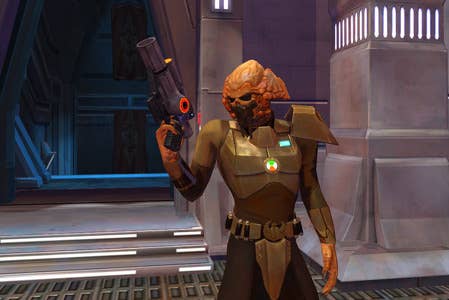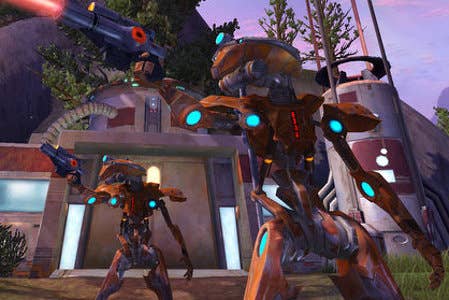James Ohlen: Vive la Republic
BioWare's lead designer on Star Wars the Old Republic talks fans, subscriptions and free-to-play
When I walk into the interview room at the Barcelona conference centre hosting last month's Gamelab, I'm not sure what to expect of James Ohlen. Meeting your heroes is one of the better perks of the job, but it's hard not to have a mental picture of the person you're about to talk to - formed from years of consuming their creative output.
Ohlen has been a keystone of BioWare's team for 15 years, playing the role of lead designer on the legendary Baldur's Gate 1 and 2, Knights of the Old Republic, NeverWinter Nights and Dragon Age: Origins. For the past six years or so he's been occupied with the game hailed as EA's most expensive project ever, the last hope for subscription MMOs and a new front in the ongoing campaign against Activision Blizzard: Star Wars the Old Republic.
Given the nature of his body of work, I'm expecting someone further towards the nerdy end of the stereotype spectrum. Smaller, quieter, probably at least a bit of a beard. Instead, I'm greeted by a garrulous and beaming man who looks like he could have easily spent all morning breaking in recruits at a marine boot camp. He definitely has a handshake of at least +2.
As soon as we sit, he apologetically rolls out some weary caveats. There'll be no questions about Mass Effect, he says. Or Dragon Age II. He didn't work on those and he doesn't feel the teams who did would "appreciate my speaking on their behalf." He's well media trained and is obviously at the end of a tiring day of interviews, largely conducted in broken English. However, once he warms to his subject and relaxes a little, sitting back and letting a smile break over his broad features, his passion for the job is undisguised.
Here is a man who clearly loves his work.
Read on for an insight into his thoughts on SWTOR, the fans, going free-to-play and why he's not leaving online behind.
Well the great thing is that I had experience of working in the Star Wars universe before, when I worked on the Old Republic. So I've had worked in the Old Republic era too. I love working in the Star Wars universe - everyone loves Star Wars so everyone on the team knows what it is about the Star Wars franchise that the fans love.
Secondly, Neverwinter Nights was released at the turn of the millennium - that had an online component too, that was a multiplayer title. In fact it had an editor which you could use to create mini MMOs. The multiplayer aspects and a lot of the rules that wee had to come up with then gave us a leg up on what we did with the Old Republic.

In fact, I used the Neverwinter Nights toolset to prototype The Old Republic for the first year and a half and the writers used Neverwinter Nights to write half the game, the first chapter was all written in NWN, then we transferred it over to the new toolset. So NWN and KOTOR gave us a real leg-up.
NWN was huge game for BioWare, not just because it sold a lot of copies and did well critically, but because the toolset allowed us to build a bigger community and create an online community, but it was also a recruitment tool. A lot of best designers were NWN modders.
A lot of designers will send in a resume saying how great they are at design and maybe they have some experience, but it's always hard to tell, were you really the guy who made all that cool shit in that game? Hard to say. With NWN we could literally have them send in their mods, take a look at the mods and the scripting, see how creative they are. That allowed us to focus in on the best of the best.
Oh yeah, having worked on KOTOR we were familiar with working with them. The great thing about LucasArts and the Star Wars IP is that, surprisingly, George Lucas actually gives a lot of freedom to work within the universe. With a lot of other IPs you have very strict rules to work within. From what I understand, Lord of The Rings is that way, Harry Potter is that way, Marvel Comics...
The Star Wars universe is huge and as long as you understand the basics of that universe, good vs. evil, Jedi, the Force etc, you're pretty much free to do what you want. We never had any problems in terms of world or story creation.
I don't think so. The SwtoR project was so huge that, for that kind of investment and time, it really required knowledge that it was an experienced studio doing the work.
I don't think so. Now that I've worked in online, it has so many fresh challenges - it's always fun to challenge yourself as a designer. There have been so many lessons I've learned on the Old Republic that I'd love to apply to bringing story to online games again. I think there are so many ways to bring story to that. So, no, I don't want to give up on online and return to single-player games. I also don't think that the industry is moving that way.
"The longer it takes from announcement to release, the more the fans build that picture in their heads. When it doesn't match that picture, they can be upset"
I think there was an expectation. Because it was a game which we promoted a game for many many years, when you do that, people build up an expectation of what they think the game should be when it's released. The longer it takes from announcement to release, the more the fans build that picture in their heads. When it doesn't match that picture, they can be upset.
There was some of that. That's partly our fault for having announced the game so early in the process. There was also, and this is something we fought against but we could never really overcome, right from the beginning we wanted to be a classic MMORPG. I think the fans decided that we were actually going to be in no way like MMORPGs. People had this expectation that we were going to revolutionise the industry. That was never our intent.
Maybe in a future online game we can go a little crazier, but for SwtoR we wanted to do the classic story telling that BioWare is famous for combined with the MMORPG genre and Star Wars. That was our vision. We did innovative things, like multiplayer dialogue, that people had never seen before, but I think that expectations are nearly always different.
We don't really compare ourselves to either Rift or WoW, we have our own goals, so we're not really looking at other games' subscriber numbers. It's also hard to tell what the subscribers really are, right? WoW has the benefit of all their China numbers where they can hide the true North American and European numbers and Rift announced a billion years ago, so no-one really knows what either of those are.
We're part of EA, a public company, so we're announcing absolute numbers. Which kind of sucks in some ways, but there you are! [laughs] We know that at the end of the day we ave to have a hugely compelling social experience. We have a multi-stage strategy for getting more players together and making socialisation easier - the first stage of that was player transfers. We've had a ton of players moving from a server where they felt they weren't having so much fun because of population numbers, to higher pop servers. We have the group finder which came out this week, which lets players find friends really easily, in as little as a minute, whereas before it could take up to an hour.
Then we have programmers working on technology for our servers which will allow us to put a lot of players together.
Yes - you know about that? We're doing all of these things. If players feel you have a living breathing world then they're going to stick around. That's not all they're going to stick around for, you have to provide high value content, obviously we have a full team working on that. We also have the updates we announced at E3 and we have more plans for this year and next year, lots of new content.
There are always three things you're trying to do in an MMO. Firstly you're trying to retain your players. That's the most important thing. You don't want to lose the players that you already have, you spent a lot of energy gathering those players. Then you want to re-acquire players. All MMOs, and Warcraft is a good example, will go through cycles where players will drift off and then there'll be an expansion pack and they'll all come back.
You need a way of recapturing those players who've tried out your game, liked it and want to come back. The good thing is that our exit surveys show that players leave SwtoR with a good taste in their mouths. They usually say things like they don't have the time, or want to spend the money right now - it's not 'your game sucks, screw you', so that's good!
Thirdly you're trying to acquire new players. With the Star Wars Franchise it behooves us to get more Star Wars fans who might not be players to try the game, but we don't want to do anything to the game that might change the experience for our hardcore fans - they're our most important.
If you piss those guys off, you kill your game.
I shouldn't really comment on that at this point.
The free to play levels is something that we wanted to do earlier, we were just getting all the tech in place for it. Obviously having a free trial is very important in getting new layers to try your game. The biggest barrier to entry for all MMOs is always the subscription. A lot of people won't try a game if you need a subscription, so if you have a free trial it lets people see if they like the game and want to pay a sub. That's about all I can say.

Well the amount of time it takes to level up is either on par or greater than almost every other MMORPG out there. The problem we actually had was that, even though we had 150-200 hours of content, our player engagement rate was much higher than we expected. What that means is that, players, on average when we had 1.7 million players, were playing six hours a day. On average. So six times seven, that's a full working week. So there were players who were somehow playing for 100 hours a week, too.
There was one player, I don't know if it was two on one account, that was playing so much that he was getting three hours of sleep for a month. That must have been two people. I hope so, for the sake of their health!
But yes, player engagement was so high, that, if you play for 40 hours a week for a month, that's 160 hours and you're done. So we were kind of caught flat-footed there. We hadn't planned for that. But it was a weird thing. It was a good thing in that players loved the game so much that they played it so much. No other game in EA's history has ever had such a high engagement rate, no other EA game has ever had that six hour average.
We learned from our research that SwtoR had a higher player engagement than any other game released that year. So it means that we've been putting a lot of focus on building on the elder game and improving it because players are getting there faster.
When the interview is over and the tape is switched off, we chat for a few minutes about Baldur's Gate 2, my inner fanboy getting the better of me. James Ohlen can speed run the game, which offers well over 100 hours of gameplay, in 57 minutes. I'm quietly impressed.

